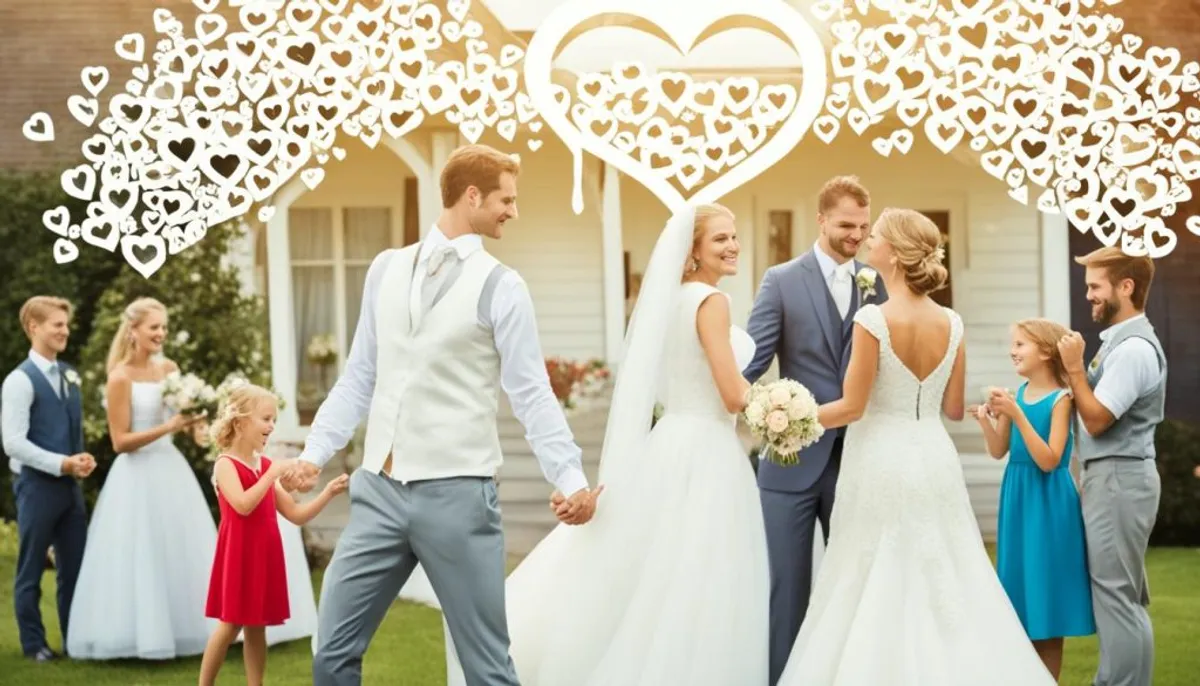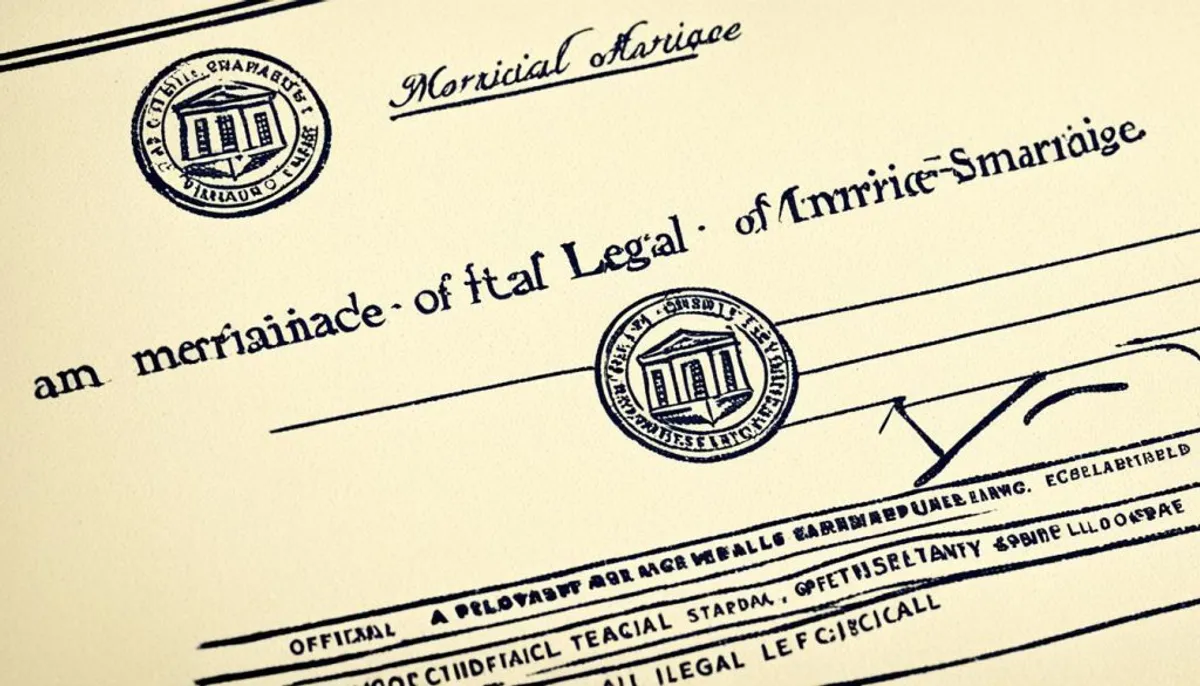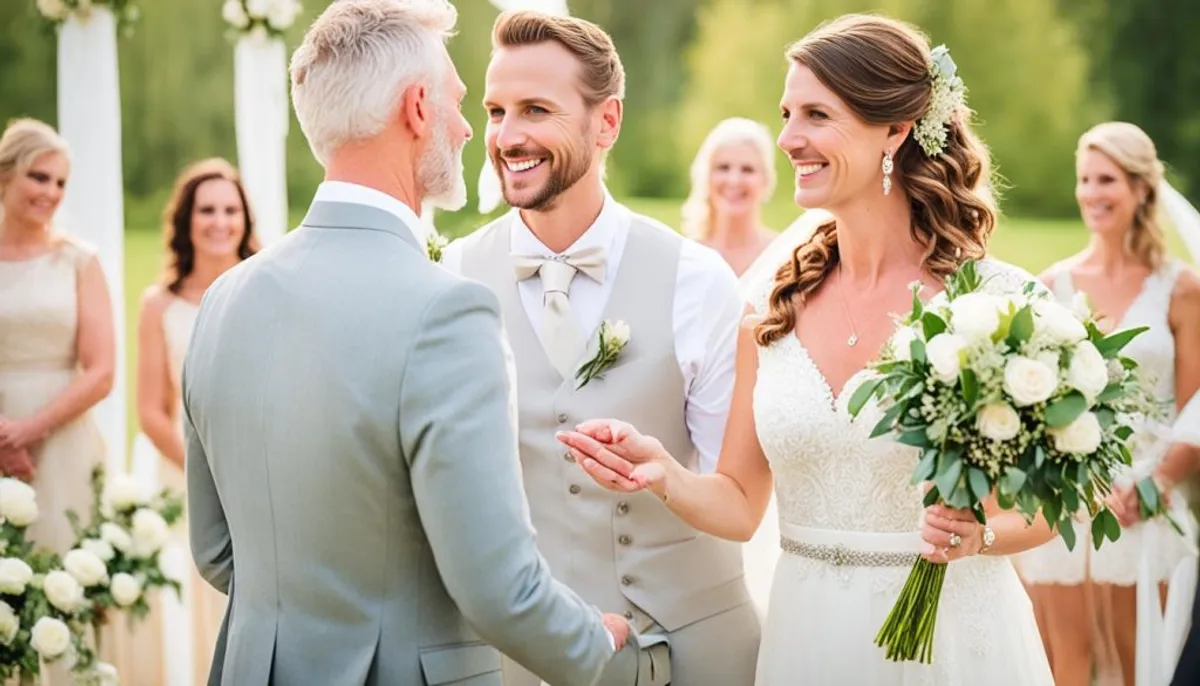Many people think “marriage” and “wedding” mean the same thing. But they don’t. Marriage is a legal agreement that makes two people a couple. It gives them certain rights and duties. A wedding, however, is the big celebration that starts a marriage.
Marriage is a legal deal with about 40 words, including the couple’s names and signatures. It makes the couple spouses, with all the rights and duties that come with it. A wedding is when the couple says they’re in it for life, marking the start of their marriage.

Today, many couples get a quick legal marriage at home and then have a big wedding in their dream place. They work with an independent celebrant to make the wedding special. This way, they get to have a unique wedding and still make their marriage official legally.
The Distinction: Legal Contract vs. Ceremonial Celebration
Understanding the difference between the legal contract and the ceremonial celebration of marriage is key. In the past, marriage was mainly for proving legitimacy and inheritance. Now, many couples, whether not religious or of mixed faiths, prefer to register their legal marriage requirements with a registrar, not a religious minister.
A registrar usually provides a non-religious ceremony along with the legal marriage. But this might not meet what the couple wants for their big day. The ceremony is where couples make their vows and promises. It’s a shorter event compared to the reception.
Marriage: A Legal Contract
The marriage definition includes the legal contract that connects two people, giving them rights and duties. This legal part is often the main focus for those not tied to a specific religion. The legal marriage requirements include getting a marriage license and filing it with the right authorities to make the union official.

- Marriage gives legal recognition and protection to the couple.
- It brings rights and duties, like shared property and making joint decisions.
- The legal contract is often the main concern for non-religious or interfaith couples.
Personalizing Your Wedding Ceremony
Independent Celebrant-Led Weddings
If you want a wedding ceremony that’s all about you, an independent celebrant might be the answer. They let you add your special touches to every part of the day. This includes the words used and any special themes or elements you want, even if they don’t have religious ties.
Some couples get legally married at home and then have their dream ceremony with an independent celebrant at a place they love. By choosing independent celebrants, they get to celebrate in a way that shows off their unique style and beliefs.
An independent celebrant can help you make your wedding ceremony truly yours. Independent celebrants can mix in cultural traditions and personal touches. This makes your wedding ceremony stand out and be memorable for everyone.
No matter if you want a big, fancy wedding or a small, cozy one, an independent celebrant can make it happen. They’ll bring your wedding traditions to life in a way that feels real and true to you.

is marriage and wedding the same
Many people think “marriage” and “wedding” mean the same thing, but they don’t. Marriage is a legal deal between two people that gives them certain rights and duties. A wedding, on the other hand, is the big celebration where they say their vows and become married.
The main difference is in what they are. Marriage is the legal part, while a wedding is the big event that shows off the marriage. Many couples have both a legal marriage and a big celebration, even if they don’t happen at the same time.
| Marriage | Wedding |
|---|---|
| Legal contract recognized by the state | Ceremonial celebration of the marriage |
| Grants specific rights and responsibilities | Public declaration of the couple’s commitment |
| Can happen before or after the wedding ceremony | Often follows the legal marriage, but can also precede it |
Some couples now get a quick legal marriage at home and then have a big wedding in a dream place later. This way, they get the legal benefits of marriage and can celebrate with loved ones in a big way.
Understanding the difference between engagement vs marriage and wedding is key. It helps couples plan their big day in a way that fits their love story. By knowing the differences, couples can make their special day truly their own.
Cultural Traditions and Customs
The world is getting more connected, and so are marriage traditions and wedding customs. These customs show the many ways people celebrate when two lives join together. They range from big and fancy to small and personal.
Before, weddings were often in religious places, seen as a sacred promise to God. Now, the idea of a “wedding” has changed. Couples can pick from many places, like old buildings or beautiful outdoors, that match their style and beliefs.
Also, the old rules about wedding invitations and what to wear are not as strict anymore. Now, couples can show off their unique style with creative invites or outfits. This lets them add their own special touches to their marriage traditions, making their day stand out.
Looking into marriage traditions and wedding customs shows how much we all want to celebrate love and community. Whether it’s a big, fancy event or a small, close gathering, these traditions still move and inspire us. They give us a peek into how we honor the lasting bond of marriage.
Conclusion
Marriage and wedding are closely related but not the same thing. Marriage is a legal agreement that makes two people officially a couple. A wedding is the big celebration of this union. When considering engagement vs marriage, couples can choose to get legally married at home and then have a special wedding in their dream place with an independent celebrant.
Wedding traditions have become more diverse, letting couples make their day special. They can add cultural touches, focus on being eco-friendly, or just celebrate their love. The modern wedding is now a unique way for couples to show their love and commitment.
Knowing the difference between marriage and wedding shows how important it is to understand the legal and ceremonial sides of this big event. By getting to know these differences, couples can make their marriage and wedding truly their own.
RelatedRelated articles



